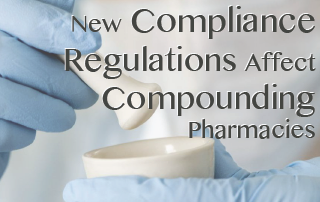New Compliance Rules for Independent Compounding Pharmacies

 The future of compounding is changing as we know it. It seems as though each quarter new regulations are drafted and debated within the community, making it difficult for compounding labs to keep up with what is currently required. Unfortunately, the compounding world won’t know for sure what the future holds until after April 2014 when final regulations from the Food and Drug Administration are presented, but here are some things that will affect your compounding lab right now.
The future of compounding is changing as we know it. It seems as though each quarter new regulations are drafted and debated within the community, making it difficult for compounding labs to keep up with what is currently required. Unfortunately, the compounding world won’t know for sure what the future holds until after April 2014 when final regulations from the Food and Drug Administration are presented, but here are some things that will affect your compounding lab right now.
The New England Compounding Center outbreak and how it affects you…
In 2012, the New England Compounding Center had a major outbreak of fungal meningitis that led to over 40 deaths. This outbreak highlighted issues within the Food and Drug Administration on regulating compounding pharmacies. The result of which has created strict requirements for compounding pharmacies, especially compounding pharmacies that may be considered manufacturers or “outsourcing facilities.” According to the Drug Quality and Security Act, signed in November 2013, compounding pharmacies will fall into two different groups a 503A facility or 503B facility. Most compounding pharmacies will fall under a 503A facility. Currently, in the regulation draft, compounding pharmacies that send more than 5% of their compounding prescriptions out of state to patients or practitioners will need to register as 503B outsourcing facilities and will need to follow stricter procedures.
More safety requirements and policies and procedures are on the horizon. Fortunately, many compounding pharmacies have most of these requirements in place already. However, if you are unsure that your compounding lab would pass an inspection, now is the time to get in compliance. As with “HIPAA Police,” FDA inspections are drastically increasing due to the New England Compounding Center outbreak.
Ensure these items are in place for compounding compliance:
- Updated policies and procedures that meet Food and Drug Administration, PCAB™, USP <795> standards and USP <797> standards
- Procedures for chemicals, components and completed prep
- Procedures for compounding record keeping Procedures for beyond-use-dating
- Procedures for product safety, labeling and shipping
- Personnel and HR documentation
- Facility and equipment management documentation
- Total quality management
- HIPAA compliance procedures
- OIG/GSA/SAM monthly exclusion verification
- OSHA rules and regulations for chemical and compounding preparation
- Bloodborne Pathogen Plan
- Hazard Communication Plan
